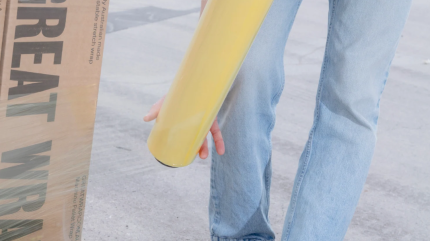
Sustainable packaging startup Great Wrap has formally entered voluntary administration, carrying debts of AU$39m, after being unable to cover its operating costs, meeting investor expectations or turning a profit.
Founded in 2019 by Jordy and Julia Kay, once celebrated for its compostable wrap alternatives, the company has now shut down operations and terminated all staff.

Discover B2B Marketing That Performs
Combine business intelligence and editorial excellence to reach engaged professionals across 36 leading media platforms.
From bright promise to harsh reality
Great Wrap caught the public eye with its mission to replace traditional plastics.
Its products — compostable cling wrap, compostable stretch wrap and reusable dispensers like “Great Mate” — were made from food waste and plant-based polymers. Local and global recognition followed, including awards and grants.
The founders were backed by government support and private investment of around AU$28 million. But despite all this, the business never made a profit.
The company saw revenues drop by about 32% from financial year 2023 to 2025, while in FY25 its costs exceeded its income by over 800%.

US Tariffs are shifting - will you react or anticipate?
Don’t let policy changes catch you off guard. Stay proactive with real-time data and expert analysis.
By GlobalDataHigh costs, input price pressures, and working capital shortfalls made sustaining operations difficult. The administrators flagged that market trends shifting away from purely compostable solutions, toward recyclable and recycled content packaging, also worked against Great Wrap.
What happens now
Great Wrap entered administration on 17 September 2025. All five employees have been made redundant and operations at the Tullamarine factory ceased.
Secured creditors, unsecured creditors and related‐party creditors are owed millions; staff entitlements (wages, annual leave, superannuation) are unlikely to be fully met without help from the government’s Fair Entitlements Guarantee.
Administrators are preparing for a creditors’ meeting which could mark Great Wrap’s liquidation. There are also potential legal consequences: preliminary investigations suggest the company may have traded while insolvent since mid-2023, which could lead to claims against the director.
Lessons for the green start-up sector
Great Wrap’s collapse underlines how hard it is to scale sustainable packaging.
Having a good idea and early praise doesn’t always protect a company from harsh realities: high production costs, tight margins, shifting market demand, and the need for continuous capital to scale.
For companies trying similar models, this case highlights the importance of financial resilience, adapting quickly to changing trends, and having backup plans if large markets or sales do not materialise as expected.





